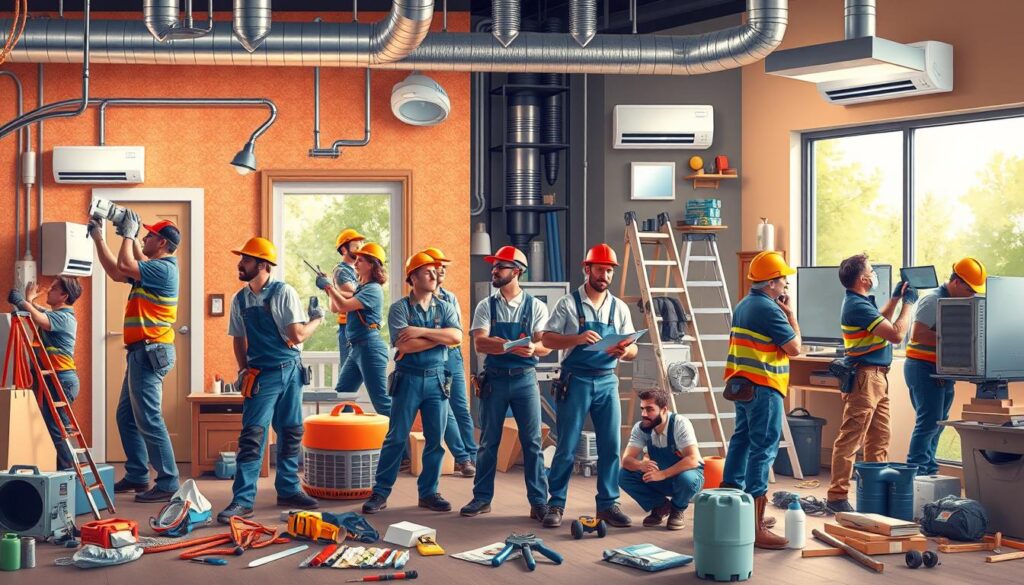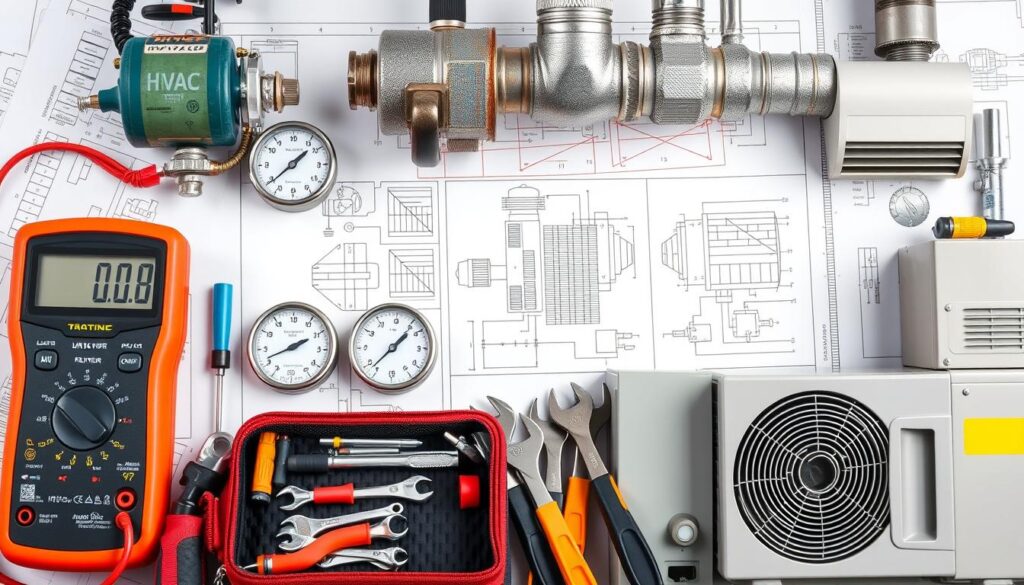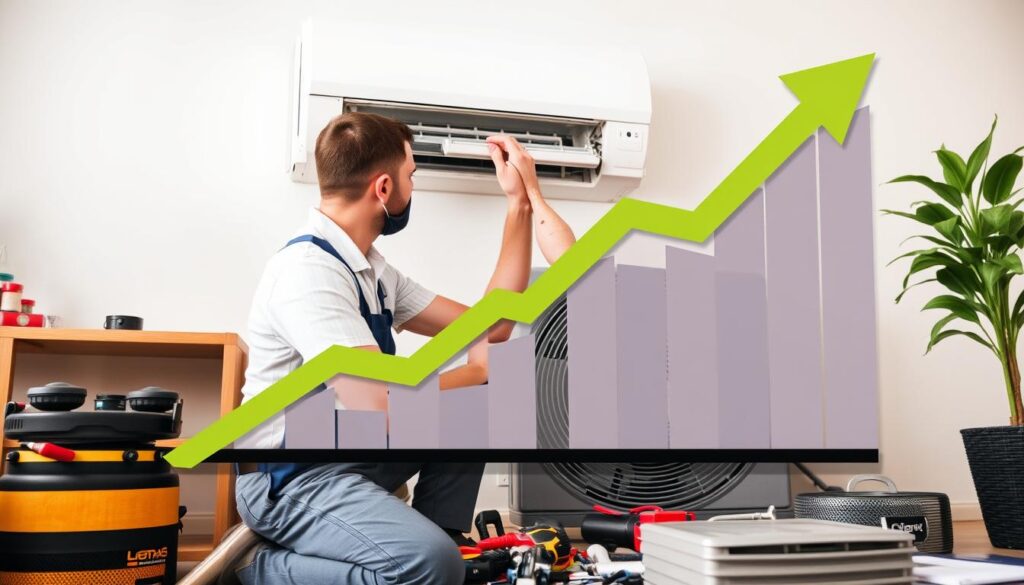Affiliate Disclosure
HVAC Guide Guys is a participant in the Amazon Services LLC Associates Program, an affiliate advertising program designed to provide a means for sites to earn advertising fees by advertising and linking to Amazon.
Do You Need College for HVAC? Are you thinking about a career in heating, ventilation, and air conditioning (HVAC)? You might wonder if college is a must. But, here’s the thing: you don’t always need a four-year degree to succeed in HVAC. This guide will show you the many ways to start your HVAC career.

Key Takeaways
- HVAC technicians keep places comfortable for many industries.
- The HVAC field is growing fast, thanks to the need for better climate control.
- Technical schools and community colleges offer great HVAC training and certifications.
- Apprenticeships give you real-world experience and valuable credentials, a good alternative to college.
- HVAC techs need skills like technical know-how, problem-solving, and customer service.
Table of Contents
Understanding the HVAC Industry Basics
HVAC systems are key in keeping buildings comfortable. HVAC technicians install, maintain, and fix these systems. They make sure they work well.
What HVAC Technicians Do
HVAC technicians do many things to keep systems running right. Their tasks include:
- Diagnosing and troubleshooting issues with HVAC equipment
- Performing routine maintenance and preventative care on HVAC systems
- Installing new HVAC systems and components
- Repairing or replacing malfunctioning HVAC equipment
- Ensuring HVAC systems comply with safety and environmental regulations
The Role of HVAC in Modern Buildings
HVAC systems are vital in today’s buildings. They control temperature, humidity, and air quality. This keeps indoor spaces comfortable and healthy.
Types of HVAC Systems and Equipment
HVAC technicians need to know about different systems and equipment. This includes:
| HVAC System | Description |
|---|---|
| Furnaces | Heating systems that use natural gas, electricity, or oil to generate warm air. |
| Air Conditioners | Systems that cool and dehumidify indoor air by removing heat and moisture. |
| Heat Pumps | Versatile systems that can both heat and cool a building by transferring heat. |
| Ductwork | The network of air distribution channels that circulate conditioned air throughout a building. |
| Thermostats | Controls that regulate the temperature and operation of HVAC systems. |
Knowing about different HVAC systems and equipment is crucial. It helps HVAC technicians offer the best service to their clients.
Explore Our HVAC Shop
Looking for top-rated HVAC tools, parts, and accessories? Visit our shop and find the perfect solution for your needs.
Visit the ShopDo You Need College for HVAC
A college degree is not always required for HVAC jobs. Yet, most HVAC technicians need postsecondary education or specialized training. They often get this from technical schools, trade schools, or community colleges.
These programs can take just 10 months to finish. They result in a certificate of completion. Others start through apprenticeships, which mix on-the-job training with classroom learning.
Those with post-secondary training usually earn more and have lower unemployment than high school graduates. HVAC technicians with this training make $200,000 more over their careers than those without it.
The average starting salary for Refrigeration Technologies was $33,488 for RSI graduates in 2017-2018. Also, HVAC technicians earned a median of $50,590 in 2020. The top 10% made over $80,820 annually.
HVAC training can last 6-24 months, leading to a certificate or associate degree. Yet, the bottom 10% of HVAC technicians earned less than $31,910 in 2020. So, education and training greatly affect an HVAC professional’s salary and career.
“HVAC technicians in the Phoenix area had an annual mean wage of $46,710 according to BLS data May 2018.”
In short, while a college degree isn’t needed, HVAC education requirements usually include post-secondary training or an apprenticeship. This specialized knowledge and experience can open up better HVAC career paths and increase earning potential.
Educational Paths to Becoming an HVAC Technician
Thinking about a career as an HVAC technician? You’re in luck because there are many ways to learn. You can choose from trade schools, community colleges, or apprenticeships. Each option helps you find the best fit for your goals and how you learn best.
Trade School Programs
Trade schools focus on hands-on HVAC training. You can finish these programs in under a year. They teach you the skills to work on HVAC systems, and the job market is growing fast.
Community College Options
Community colleges offer more in-depth education with associate degrees in HVAC technology. These programs mix theory and practice. They prepare you for many HVAC tasks. Getting an HVAC certificate usually takes about 9 months, making it a quick way to start your career.
Apprenticeship Programs
Apprenticeships last from three to five years. They combine on-the-job training with classroom learning. This way, you learn by doing and get valuable experience from experts.
Every path has its benefits, and the right one depends on your goals and the job market. Whether you choose a trade school, community college, or apprenticeship, you’re on your way to a fulfilling HVAC career.
Explore Our HVAC Shop
Looking for top-rated HVAC tools, parts, and accessories? Visit our shop and find the perfect solution for your needs.
Visit the ShopHVAC Certification Requirements
To work as an HVAC technician, you need the right certifications. The most important one is the EPA Section 608 Technician Certification. This is needed for working with refrigerants. There are different levels for different equipment, like Type I, Type II, Type III, and Type IV.
Some states also have their own HVAC certifications or licenses. The North American Technician Excellence (NATE) certification is a top choice in the industry. It shows you’re skilled in HVAC systems.
| Certification | Description | Cost | Experience Required |
|---|---|---|---|
| EPA Section 608 Certification | Covers handling refrigerants, with different certification levels for various equipment types | $20 to $150, depending on jurisdiction and exam type | Typically 12 months of practical experience |
| NATE Certification | Industry-recognized certification demonstrating HVAC expertise | Varies by certification, typically $100 to $300 | Varies by certification, may require training or experience |
To get the needed HVAC certifications, you can join trade school, community college, or apprenticeships. These programs teach you about refrigeration, air conditioning, and heating.
Remember, HVAC certification requirements can change by state. So, it’s key to check your local rules. This way, you’ll know you meet all the requirements to work as an HVAC technician.
HVAC Apprenticeships vs. College Programs
Aspiring HVAC technicians face a choice: HVAC apprenticeships or college programs. Each path has its benefits, depending on your goals and situation.
Benefits of Apprenticeships
HVAC apprenticeships let you learn by doing. You work with experienced technicians, gaining practical skills. This hands-on approach suits those who learn best by doing.
Advantages of Formal Education
HVAC college programs offer a deeper dive into HVAC systems. They cover a wide range of topics, preparing you for advanced roles. This can lead to higher pay in the future.
Cost Comparison
The cost of HVAC education varies. Apprentices earn a stipend, starting at 50% of a technician’s pay. College programs, however, can cost between $500 and $30,000.
| Educational Path | Average Cost | Earning Potential |
|---|---|---|
| HVAC Apprenticeship | Stipend (starting at 50% of experienced technician pay) | Increasing as skills are gained |
| HVAC College Program | $500 to $30,000 | Higher long-term earning potential |
Choosing between apprenticeships and college programs depends on your goals and finances. Both paths can lead to a rewarding HVAC career. It’s crucial to consider your options carefully.
Explore Our HVAC Shop
Looking for top-rated HVAC tools, parts, and accessories? Visit our shop and find the perfect solution for your needs.
Visit the ShopEssential Skills and Training for HVAC Professionals
To be a top HVAC (Heating, Ventilation, and Air Conditioning) pro, you need both technical and soft skills. As an HVAC tech, you’ll understand electrical systems, read blueprints, and know HVAC equipment well. These HVAC skills help you fix, keep, and repair systems well.
HVAC professional development isn’t just about tech skills. Soft skills like problem-solving, customer service, and clear communication are key. You’ll work with people, so listening, solving problems, and explaining things clearly is important.
Keeping up with new tech and energy rules is vital in HVAC. To offer the best service, HVAC techs must keep learning. This means going to workshops, getting certifications, and knowing the latest trends.
| Technical Skills | Soft Skills |
|---|---|
|
|
By always learning and growing, HVAC pros can meet the industry’s changing needs. They can also give their customers the best service.

Career Advancement Opportunities in HVAC
The HVAC industry offers many chances for career growth and specialization. As an HVAC technician, you can improve your skills and earn more. You can also take on bigger roles in the field.
Specialization Options
HVAC technicians can specialize in areas like commercial refrigeration or solar technology. This makes you more valuable to your employer and can increase your salary. Specializing often requires extra training and certifications, but it can lead to better career opportunities.
Management Positions
With experience, HVAC technicians can move into supervisory or management roles. These jobs may involve leading a team or managing big HVAC projects. Managerial roles come with higher pay and more responsibility, making them appealing to those looking to advance.
Business Ownership Paths
Some HVAC professionals start their own businesses. They offer HVAC services directly to customers. This path requires experience, business skills, and a good understanding of the local market and regulations.
| HVAC Career Advancement Opportunities | Average Hourly Pay | Annual Salary |
|---|---|---|
| HVAC Technician (Entry-Level) | $22.47 | $46,737 |
| HVAC Technician (10+ Years Experience) | $32.83 | $68,286 |
| HVAC Project Manager | $35.58 | $74,006 |
| HVAC Sales Representative | $27.89 | $58,011 |
| HVAC Business Owner | Variable | Variable |
By exploring specializations, management roles, or starting your own business, you can find many HVAC career advancement opportunities. These paths can significantly boost your earnings. Keep learning and getting certified to reach the top in your HVAC specializations.
Explore Our HVAC Shop
Looking for top-rated HVAC tools, parts, and accessories? Visit our shop and find the perfect solution for your needs.
Visit the ShopHVAC Industry Job Outlook and Salary Expectations
The HVAC industry in the United States is growing fast. The HVAC job outlook is expected to increase by 6% from 2022 to 2032. This is much faster than the average job growth rate. The U.S. Bureau of Labor Statistics (BLS) reports there were 415,800 HVAC technician jobs in 2022. The industry will see about 37,700 new job openings each year for the next decade.
The median annual wage for HVAC technicians was $51,390 in May 2022. The lowest 10% made less than $36,170, while the top 10% earned over $82,630. Your salary can vary based on location, experience, and specialization. For example, HVAC professionals in the District of Columbia, Alaska, and Massachusetts earn the most.
| Industry | Median Annual Wage |
|---|---|
| Wholesale trade | $57,760 |
| Educational services | $54,950 |
| Retail trade | $54,760 |
| Plumbing, heating, and air-conditioning contractors | $49,630 |
HVAC apprentices start with lower salaries but see increases as they gain experience. Those with certifications like Section 608 Technician, North American Technician Excellence (NATE), and HVAC Excellence often earn more.
“The job prospects for HVAC technicians are projected to be faster than the average for all occupations through 2032.”
In summary, the HVAC industry in the United States offers a bright HVAC job outlook and good HVAC salary expectations for skilled professionals. With the demand for HVAC systems increasing, a career in HVAC can be both stable and rewarding.

Licensing and State Requirements
Licensing for HVAC work changes a lot from state to state. Some places, like Texas, need technicians to have a license. But, others, like South Dakota, don’t require it at the state level. To get a license, you usually need to show you’ve worked in the field, pass a test, and sometimes prove you have insurance.
Even if a state doesn’t require a license, local areas might have their own rules. It’s very important for HVAC workers to know the specific rules in their area. This ensures they work legally and safely.
| State | HVAC Licensing Requirements |
|---|---|
| Texas | HVAC technicians must be licensed by the Texas Department of Licensing and Regulation. |
| South Dakota | No state-level HVAC licensing requirements, but local municipalities may have their own regulations. |
| California | HVAC contractors must have a C-20 HVAC license for work over $500, which requires passing trade and business exams and having at least four years of experience. |
| Florida | HVAC contractors must obtain one of four licenses, ranging from Class A State Certified Contractor to Class B State Registered Contractor, each with different limitations on the size of units they can work on. |
| Georgia | The HVAC industry is regulated by the Division of Conditioned Air Contractors of the Construction Industry Licensing Board, and technicians must be licensed as “Conditioned Air Contractors”. |
It doesn’t matter where you are, keeping up with HVAC licensing and state HVAC requirements is key. It helps HVAC pros work legally and offer top-notch, safe services to their customers.
Explore Our HVAC Shop
Looking for top-rated HVAC tools, parts, and accessories? Visit our shop and find the perfect solution for your needs.
Visit the ShopUnion vs. Non-Union HVAC Work
HVAC technicians can choose between union and non-union jobs. Knowing the differences helps you pick what’s best for your career.
The Union Advantage
HVAC unions like the United Association (UA) and SMART offer great benefits. They have apprenticeship programs and support for members. Being in a union can mean higher wages and better benefits.
- Higher starting wages for entry-level HVAC helpers, around $15 per hour
- Potential to earn over $42 per hour after 4-5 years of experience
- Paid overtime at time and a half or double time
- Comprehensive medical benefits and a pension plan
- Guaranteed pay raises and career advancement opportunities
The Non-Union Approach
Non-union HVAC jobs offer more freedom but may not have the same benefits as unions. They might start with higher wages, but union jobs often have better long-term pay and security.
Choosing between union and non-union work depends on your goals and the job market. Knowing the pros and cons helps you decide what’s best for your HVAC career.
“HVAC on-the-job training can lead to entry-level technicians earning around $100,000 per year with overtime within 5 years.”
Conclusion
The HVAC career guide has given a detailed look at the HVAC industry. It shows the many career paths and growth chances in this field. While college isn’t always needed, most HVAC techs need some postsecondary education or an apprenticeship to learn the skills.
The HVAC industry looks promising, with jobs expected to grow by 15% by 2026, says the Bureau of Labor Statistics (BLS). HVAC techs can make good money, with a median salary of $45,910 in May 2016. The highest earners can make over $73,000. Getting formal training can lead to better job chances.
Choosing to go to HVAC trade school, community college, or an apprenticeship is key. The field needs constant learning and keeping up with new tech. With certifications, specializations, and chances to move up, HVAC offers a fulfilling career for those who like hands-on work and solving problems.

